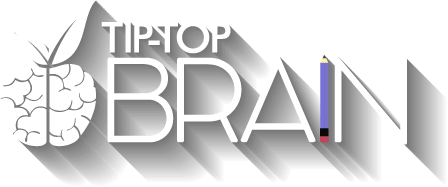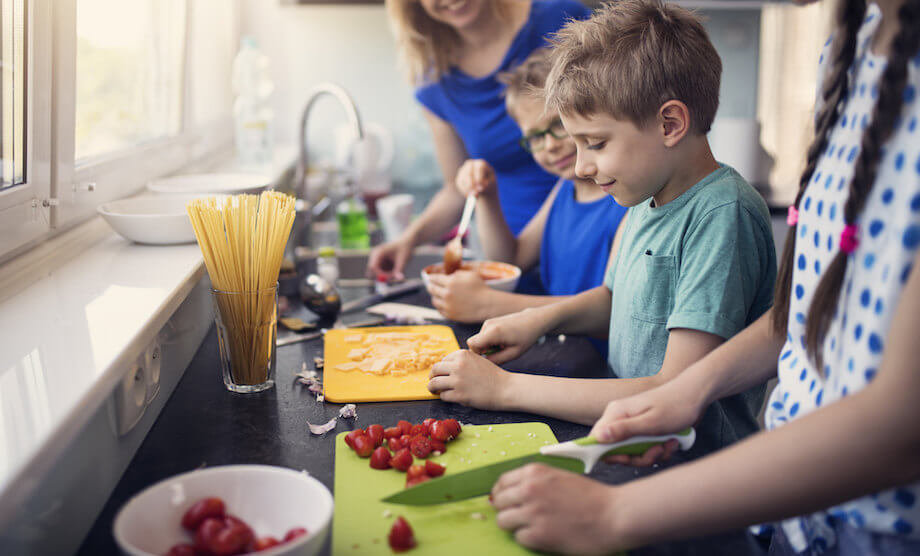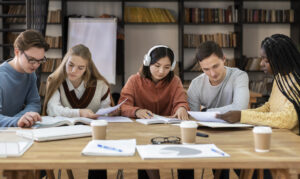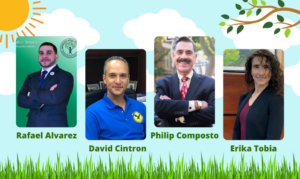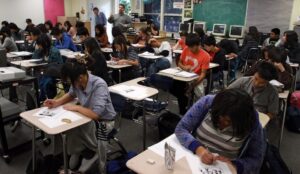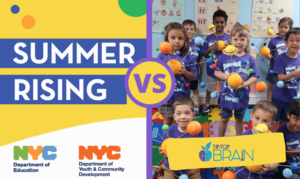Cooking lessons and kitchen learning activities just may be your new best friend. Facilitating learning activities for your kids can feel corny. How can you entertain and maintain their interest while also teaching them? Our mind often jumps to elaborate multi-step science experiments, but there are even more practical and subtle ways to execute learning activities. Believe it or not, the answer lies in your kitchen! Cooking lessons are chock-full of opportunities to talk about science and math while learning how to prepare food! With the holidays approaching, there’s never been a better time to bust out your apron and a cookbook and try out some kitchen learning activities.
Math
In my opinion, math is an intuitive academic subject to integrate into kitchen learning activities. Even cooler, the math can start long before any cooking does. For instance, you can flip through a cookbook with your child and choose a recipe you plan to make. You can task your child with compiling a list of ingredients that you’ll need from the grocery store. Upon arrival, your child can budget your shopping trip using your grocery list. In order to incentivize critical thought, tell your child that any surplus in your budget can be spent on toppings like sprinkles for cookies or chocolate chips for waffles. This encourages kids to think deeply and analytically about expenses and talk out elementary math calculations.
Once you’re home and ready to start a cooking lesson, you can spark up a conversation about the number of servings your recipe produces. The success of kitchen learning activities are contingent on dialogue. Ask your child, should we double or halve the recipe? How will that change the ingredient measurements? Simple, natural conversations like these inspire thought about equivalent fractions and proportions and describe common computations in their curriculum.
Science
Science is what makes cooking possible, literally. There are nearly as many opportunities to start a scientific dialogue with your child through cooking lessons as there is math. However, you may need to plan your activity a bit more. In the most general sense, following a recipe is similar to the methodology underpinning science experiments, with the goal of altering the chemical or physical characteristics of our ingredients.
For younger children, you can keep your cooking lessons or kitchen learning activities can be fairly simple. Ingredients offer a cornucopia of specimens for observation. Plant science lessons can revolve around examining actual tomatoes, apples, and carrots, and describing the differences and similarities. Fruits and veggies also offer neat structures of roots and leaves for study. The fun with food doesn’t need to stop there, an egg could be a model of a cell, and Thanksgiving turkey could be your own personal cadaver, the possibilities are endless!
You may be able to facilitate more sophisticated cooking lessons with older students. Some topics like density, which can be covered whenever observations on buoyancy are possible, might pop up without too much trouble. However, richer kitchen learning activities around things like chemical reactions may take a bit more deliberate effort. Chemical reactions are no doubt common throughout many recipes, but you may want to do some additional research to guide your conversation. For example, you might be able to explain that yeast or baking sodas are what makes your dough rise, but a quick Google search could allow you to expand the conversation. if not, you could always encourage your child to figure it out and have them explain it to you.
English
English cooking lessons may require more creativity to incorporate into kitchen learning activities, but I don’t think it’s impossible. Every Christmas growing up, my family and I would read the Night Before Christmas. Although the book felt like it took eons to read, my brother and I kept our eye on the prize because we knew what was coming after. In order to make sure all the reindeers made it to our house, we would fish out our recipe for “reindeer food.” Having just read the story and seen images of reindeer, the mission of mixing our glitter and oatmeal had never seemed more important. With a little creativity books like Green Eggs and Ham, or How to Eat Fried Worms could become rich kitchen learning activities disguised as proper three-course meals.
History
There is no shortage of options when it comes to history, cooking lessons, and kitchen learning activities. Food has long been a record of historical events, cultural identity, and even language. Of course, some meals, like Thanksgiving, are deeply entrenched in history and lore. However, nearly any dish could be served as a three-course lesson, with your kids certain to be asking for seconds. For younger students, themed meals or dishes are an exciting way to interweave customs and traditions from around the globe into cooking lessons. Perhaps this Monday you’ll “travel” to Italy for ravioli and gelato, or India for chicken tikka masala and naan.
You can also leverage your escapades as co-chefs to learn about your lineage. It may be cliché, but rich historical context and traditions are passed down over family recipes. I can remember cooking lessons so vividly, making pierogis with my grandmother, while she told me about the horn used to stuff kielbasa or fleeing Poland under socialist rule. In a funny way, sharing these recipes and stories is a way to teach your kid, while preserving your genealogy.
